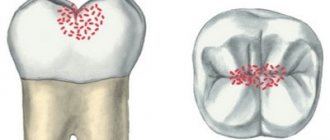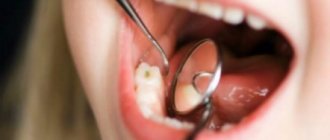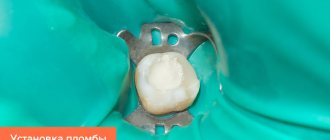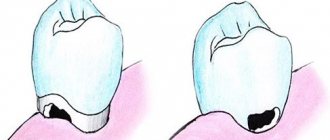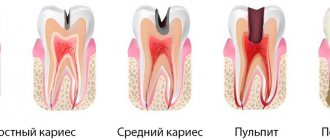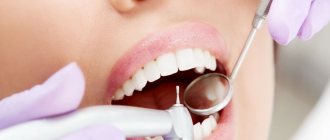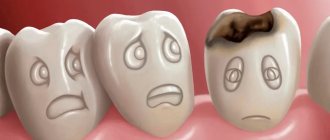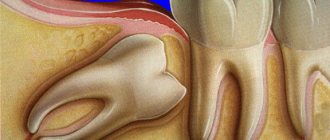Hypersensitivity as the main cause of aching teeth
What could an unpleasant ache in your teeth mean? In fact, there are quite a few possible causes, and many of them are not related to the condition of the enamel. Often the cause of the problem is inflammation of the trigeminal nerve, and in this case the person experiences not just discomfort, but full-blown pain, which can radiate to the ears, temples, eyes and jaws. Treatment of such pathological phenomena is within the competence of a neurologist. The diagnosis is quite serious, so if such symptoms appear, it is better to see a specialist as soon as possible.
But most often, teeth cramp due to hypersensitivity of the enamel (hyperesthesia), in particular when it thins. In this case, it begins to react sharply to cold and hot temperatures of foods and drinks, cold wind, sweet and sour foods, and minor mechanical irritation, for example, during daily cleaning. The reaction of each organism is individual, and many identify pain during hyperesthesia as aching in the teeth.
Teeth sensitivity may be the cause of jaw aches
If unpleasant sensations are caused by thinning of the enamel, it matters how they are localized - in the area of 1 crown or spread over the entire row. In the first case, the cause may be injury or caries. If the pain is generalized, that is, it covers the entire row or even both the upper and lower jaws, the prerequisites may lie in more serious disturbances in the functioning of the internal organs and systems.
What to do if your teeth hurt due to coronavirus
When dental problems arise, they need to be solved immediately without waiting for external circumstances to change. If your tooth hurts badly due to Covid, or its crown part has collapsed, you need to go to the dentist. During a pandemic, the clinic uses all necessary measures to protect patients and doctors from the transmission of infection:
- daily check for ARVI symptoms;
- testing for coronavirus infection every 10 days;
- mandatory wearing of protective masks, gloves, goggles;
- regular disinfection of rooms, surfaces, door handles;
- use of bactericidal lamps in offices and waiting areas.
Wearing masks is mandatory for all patients (Decree of the Mayor of Moscow No. 92-UM dated September 25, 2020). If a patient refuses to wear a mask or have their temperature taken, the appointment will be cancelled.
Why the jaw and teeth often cramp – possible reasons
Usually they say that teeth are cramping when they want to describe discomfort when the enamel is suddenly exposed to temperature - if a food or drink is too cold or hot. Weakened enamel can give an acute reaction even if the temperature difference is not so significant, as well as to spicy, sour and sweet foods, that is, to chemical irritants.
But there are other possible causes, some of which are pathological disorders that require appropriate therapy. The most common causes of the symptom are listed below.
Thinning enamel
Enamel is a durable coating that protects the internal tissues and structures of the tooth from external aggressive factors. When it becomes thin and noticeably weakened, it leads to increased sensitivity. A person begins to experience attacks of acute pain from hot and cold, spicy, sweet and sour. Discomfort also occurs during hygienic cleaning or when biting into hard foods. There are quite a few reasons for this phenomenon, so to find out the etiology you will have to undergo examination by a specialist. Among the common prerequisites, dental experts identify the following phenomena and conditions:
- genetics,
- acute deficiency of vitamins and microelements,
- abnormalities of the jaw system, including malocclusion,
- Bruxism is an involuntary clenching of the jaws at night during sleep, which inevitably leads to pathological abrasion,
- Frequent whitening using aggressive agents, violation of the technique of performing the procedure are common causes of hyperesthesia of the anterior incisors.
Frequent teeth whitening can lead to sensitivity.
The above factors gradually lead to abrasion of the enamel. Over time, this can cause aching teeth and other unpleasant sensations.
Cracks on the enamel surface
Chips and cracks usually occur due to injuries and impacts, as well as constant excessive mechanical stress, for example, as a result of the habit of chewing the tip of a pencil or biting off a thread. Damage to enamel often occurs when brushing too vigorously with a hard-bristled brush. Temperature changes in food and drinks also negatively affect the condition of hard tissues and can lead to the formation of cracks.
Cracks in teeth can cause this symptom
On a note! If it cramps some time after tooth extraction, the cause often lies in accidental nerve damage, which can happen both during the procedure itself, if it was complex, and during the administration of anesthesia. If the symptom does not go away for a long time, it is better to consult a specialist for advice.
Bruxism, jaw surgery and even inaccurate yawning - all this can lead to frequent attacks in which the jaw also cramps. Here you will need the help of a neurologist. To correct chips and cracks, aesthetic restoration is carried out, and to strengthen the enamel, remineralization and fluoridation are carried out.
Pathologies of gum and periodontal tissues
Inflammatory diseases of the gums and periodontium, both acute and chronic, often lead to frequent attacks of aches, including in the jaw. This symptom is especially common in pathological conditions aggravated by purulent processes. The waste products of pathogenic microorganisms accumulate in the thickness of the mucous membrane, provoke inflammation, gradually destroy healthy tissues and at the same time create excessive pressure on them. In addition, with gum disease, the root region of the molars is often exposed, making the enamel especially susceptible to sudden temperature changes and chemical irritants.
Periodontitis causes pain and discomfort
Malfunctions of the digestive system
The condition of the gastrointestinal tract has a direct impact on the health of our teeth and enamel in particular. When digestion fails, hard tissues quickly weaken, become sensitive, and the acid-base balance in the oral cavity is disrupted, which leads to the formation of a favorable environment for the proliferation of bacteria and the development of caries.
Frequent stress
Neuroses, stressful conditions, severe overexcitation - all these factors can lead to rather chaotic symptoms, behind which it can be difficult to identify the true cause. A strong emotional outburst can even provoke inflammation of the facial nerve, and the pain also spreads to the jaw. In neurotic conditions, pain can wake a person right during sleep1. In such a situation, the help of a neurologist and psychotherapist is required.
Stress has a detrimental effect on health
Colds
The answer to the question of whether teeth may be coming together due to reasons not directly related to the state of the enamel is already obvious - there are quite a few potential prerequisites, and not all of them are related to the current state of the enamel. So, for example, sinusitis and laryngitis often negatively affect the tissues of the oral cavity, and with influenza and sore throat, the infection can even penetrate the dental nerves, provoking quite severe attacks.
Hormonal imbalances
Hyperesthesia is a common occurrence during pregnancy, especially in the first trimester. Serious changes occur in a woman’s body, particularly hormonally. At first, there is often a sharp decline in vitamins and microelements, which causes the enamel to weaken and become hypersensitive. A similar situation occurs in women during menopause. Preventive remineralization sessions, as prescribed by the dentist, will help protect the enamel until hormonal levels normalize.
Pathologies of the cardiovascular system – angina pectoris
Attacks of angina are sometimes accompanied by discomfort in the jaw and drying out of the mucous membrane. In such cases, teeth often come together, and the provoking factor can be simple fatigue, sitting in one position for too long, headaches, migraines, or increased nervous excitability. In such a situation, it is important to relax and unwind. If an attack causes serious discomfort, it is better to seek medical help.
Joint diseases - arthritis
Inflammation of the temporomandibular joint provokes quite severe pain, which can occur for no apparent reason. With age, the joints in our body wear out, and constant physical activity leads to their deformation and the development of pathological processes. Here you will need the help of a rheumatologist or orthopedist.
The cause of the pathology can also be joint disease
Carious processes
If the pain and aches are localized in a limited area, it may be due to caries. Usually, a whitish spot first appears on the surface of the enamel, which quickly darkens and gradually turns into a cavity. Pathological processes destroy hard tissues, causing them to lose their protective functions. All this leads to the appearance of discomfort and moderate aching pain at first, which only becomes stronger over time. In this case, the pathological focus can be localized in the root region and remain hidden under the gum - cervical caries. The dentist can detect the problem during a visual examination.
Tooth decay causes discomfort and pain
Why does my teeth hurt?
Enamel hypersensitivity is a dental disease. It occurs quite often, against the background of concomitant pathologies or as a result of traumatic procedures (bleaching, the use of abrasive pastes and hard brushes).
The following predisposing factors contribute to the development of hyperesthesia:
- thinning of tooth enamel due to pathological abrasion, wedge-shaped defects or erosions accompanied by dentin exposure;
- the appearance of chips and cracks, into which cariogenic microorganisms quickly penetrate, causing infectious and inflammatory processes inside the hard tissues and neurovascular bundle of the tooth;
- frequent consumption of excessively hot or cold food, iced drinks, the habit of eating ice cream with hot coffee;
- the initial stage of caries, which is accompanied by demineralization of the enamel and an increase in its permeability under the influence of acids secreted by cariogenic microorganisms;
- poor professional teeth cleaning or enamel whitening, lack of fluoridation after such procedures;
- non-compliance with the technique of filling and etching teeth in the treatment of caries;
- periodontal diseases leading to gum recession and increased tooth sensitivity;
- short frenulum of the tongue and lips, use of low-quality dentures;
- failure to comply with personal hygiene rules, use of aggressive pastes and bleaching compounds;
- pathological conditions that are accompanied by functional and mental disorders, diseases of the digestive tract and endocrine system.
It is necessary to determine the location of the toothache. Only the upper or only the lower teeth may hurt; sometimes the pain syndrome spreads throughout the entire jaw. Some people have only one tooth that is sensitive, and it begins to ache every time it is exposed to an irritating factor.
What to do if your jaw and teeth are cramped - symptom treatment
If the reason is the density of the upper protective layer, therapy will be aimed at restoring it, and for this, the patient is usually prescribed a course of remineralization and fluoridation. The essence is to apply concentrated fluoride-containing pastes, solutions and varnishes with a high content of nutritional components to the enamel surface.
“After whitening, my enamel became very sensitive, to the point of pain. It was simply impossible to drink cold food. To be honest, I was very scared then. I went to another doctor who prescribed me a course of mineralization. He said that apparently the solution had been overexposed, in general, this should not have happened. After several sessions I felt better, of course, but I won’t risk whitening my teeth again.”
Nata87, from correspondence on the woman.ru forum
As part of the diagnosis, the patient must be sent for an X-ray examination. In some cases, a blood test is prescribed to detect infection. Based on the premises of the problem, the doctor chooses the appropriate direction of therapy:
- if the jaw is dislocated, a specialist will straighten the joint,
- pain on one side along with the appearance of swelling and heat may indicate poliomyelitis, tonsillitis or an abscess - here you need the help of a surgeon,
- in case of pathological phenomena of a dental nature, for example, with pulpitis or periodontitis, the canals are treated and filled. If a purulent formation occurs, it may require not only its removal, but also resection of the root apex, as well as antibiotic therapy. You will have to visit the dentist several times for a complete cure, but the discomfort should disappear after the first visit,
- if the pain is on one side and radiates into the eye, such a symptom may indicate inflammation of the temporal artery, in which case the patient will be referred to a surgeon,
- if the discomfort is localized in a limited area where there are signs of caries, appropriate treatment is carried out - removal of damaged tissue, antiseptic treatment, filling,
- Since the most common cause of the symptom is the thinning of the enamel and a decrease in its density, in almost all cases remineralization and fluoridation are prescribed - a course of strengthening hard tissues by applying preparations with a concentrated content of fluorine and calcium to them.
Only a specialist can determine the cause of the problem.
To choose the optimal treatment tactics, you need to correctly determine the cause of the aches and other associated symptoms. To do this you will have to undergo appropriate diagnostics. For the same reason, you should not try to get rid of the symptom on your own, with the help of traditional medicine and without first consulting a dentist.
Do teeth hurt with coronavirus?
Dental problems do not disappear just because Covid-19 is rampant in the world. Toothache can affect either one unit or the entire jaw. The pain can radiate to the temple, ear, or eye socket, and provoke a migraine. At the same time, the catalyst for such feelings is not necessarily the coronavirus.
However, SARS-CoV-2 cannot be ruled out as the cause of toothache. The entry points for coronavirus are the mucous membranes of the mouth, nasopharynx, eyes, and respiratory tract. The virus attacks mucosal cells, disrupts microcirculation in blood and lymphatic vessels, and in the presence of inflammation immediately penetrates into the blood. This causes an active immune response in the body, which explains the high percentage of Covid complications in patients with periodontal diseases.
[4]
What does traditional medicine offer?
When pain becomes a consequence of hyperesthesia, traditional medicine also comes to the rescue. But we must remember that the thoughtless use of such recipes is fraught with even more serious complications, and, moreover, without examination by a specialist, it is most often impossible to establish the cause and eliminate it. Therefore, the use of the above-described decoctions and infusions in practice is allowed only after their approval by the attending physician.
Decoctions of oak and sage bark
Oak bark helps quickly relieve pain and has disinfectant properties. A decoction from it is prepared in a water bath - there is no point in pouring boiling water over it and insisting, since the beneficial components can only be removed by slow heating. Before use, the product must be filtered and cooled. The resulting solution is used to rinse the mouth.
Gargling with a decoction of oak bark will help in treatment
Sage also has pronounced antiseptic properties. Just pour boiling water over a pinch of herb and let it brew. After this, the product should be filtered and used for rinsing. The decoction perfectly relieves discomfort and provides disinfection of oral tissues.
Products containing chamomile, baking soda and salt
Pharmaceutical chamomile is often recommended for inflammation of the gums. A pinch of dried flowers should be brewed in a glass of boiled water, left for a little while and then strained. Room temperature product is used for rinsing as needed.
Soda-saline solution is also widely popular as an effective remedy for relieving acute inflammatory processes in the oral cavity. It is used for diseases of the gums and periodontal tissues, to relieve symptoms of periostitis and other purulent-inflammatory processes. To prepare the solution, just mix a teaspoon of salt and soda in a glass of warm water. The finished product is used for rinsing the mouth.
Chamomile decoction helps relieve symptoms
Pterygoid dental implantation
What to do when your teeth hurt?
What can you do at home if your teeth are hurting? Ideally, you need to contact a dentist who will conduct a professional diagnosis and determine the true causes of the disorder. The doctor can identify enamel cracks, chips, wedge-shaped defects and other hidden damage.
The specialist can also use professional hygiene methods, remove carious lesions and fill teeth. To assess the degree of tissue damage in dentistry, X-ray diagnostics are used.
A common method of treating hyperesthesia is the use of drugs that compact the dentin structure and clog the tubules. Such products contain calcium, magnesium and fluorine ions. Fluoridation of teeth can be done quickly at the dentist's office.
The doctor applies special varnishes and gels to the enamel, and additionally recommends toothpastes with fluoride. Fluorides quickly and effectively block dentinal tubules, reducing their lumen. As a result of this effect, the fluid flow slows down and the degree of enamel reaction to external stimuli decreases.
To achieve a long-term effect of reducing tooth sensitivity, specialists use preparations with potassium salts, which reduce the excitability of the nervous structures of the dentinal tubules. This blocks the transmission of impulses and helps get rid of hyperesthesia.
Laboratory blood diagnostics will not hurt, with the help of which you can understand what vitamins and microelements are missing in your body. With the help of nutritional correction, you can significantly improve the condition of your teeth and the entire oral cavity.
Proper oral care for dental hyperesthesia
Often, teeth begin to break due to a decrease in the quality of oral care. There is always a microbial film on the surface of the enamel, which must be removed along with food debris using toothpaste and a brush. Additionally, it is recommended to use rinses that wash away cariogenic microorganisms and slow down the release of acid. Dental floss is used to remove food debris between teeth.
The composition of toothpastes should include calcium, nitrates, potassium chlorides, and fluorides. When choosing oral care products, pay attention to their degree of abrasiveness. Excessively aggressive compositions with large particles can injure the enamel and contribute to its rapid abrasion.
Folk remedies to help with hyperesthesia
If your teeth are hurting and you don’t know what you can do about it at home, try the following folk recipes as a supplement to the main treatment or as a first aid remedy in the absence of a doctor:
- Make an infusion or decoction of sage and use it as an anti-inflammatory rinse several times a day. This remedy helps strengthen the gums, destroys most pathogenic microorganisms and reduces the sensitivity of the enamel.
- Alcohol tincture of propolis. It has a pronounced antimicrobial effect, relieves bleeding gums and inflammation. You can buy the tincture at a pharmacy or prepare it yourself. Add 2-3 drops of the prepared product to a glass of water and rinse your mouth for several minutes.
- Oak bark has astringent properties and has an anti-inflammatory effect. Based on it, you can prepare decoctions and infusions that are used to rinse the mouth for inflammation and increased sensitivity of the teeth.
- Water with iodine, salt and soda. You can use homemade antiseptics to rinse. Dissolve a few drops of iodine in a glass of warm water, add a pinch of soda and salt, stir and rinse your mouth 4-5 times a day. This recipe even helps with bumps on the gums.
Prevention of enamel sensitivity
If you are prone to hyperesthesia, pay special attention to preventing enamel sensitivity. It consists of observing the following simple rules:
- brush your teeth with a soft-bristled brush;
- use toothpastes designed specifically for sensitive teeth that strengthen the enamel;
- after eating, be sure to rinse your mouth with warm water or an antimicrobial mouthwash, and ideally, brush your teeth with a brush and toothpaste;
- spend a few minutes a day massaging your gums, which maintains good blood circulation in the oral cavity and improves local immunity;
- Avoid situations where damage to the enamel may occur and teeth will begin to break again; when the first discomfort appears, you should consult a dentist.
Diet correction
Chronic enamel hyperesthesia is a reason to change your diet. Pay attention to foods rich in calcium and fluoride (milk, fish, cheese, cottage cheese). Be sure to eat foods with a high concentration of vitamin A (all orange fruits and vegetables, liver, eggs).
If your teeth often ache, completely avoid freshly squeezed juices, such as fruits such as lemons, oranges, and sour berries. After eating any potentially dangerous foods or drinks that can destroy enamel, rinse your mouth with warm water. Simple carbohydrates (sweets, baked goods) have a negative effect on the condition of teeth. They create favorable conditions for the proliferation of cariogenic microorganisms. Avoid sugary carbonated drinks and seeds.
Visit the dentist at least 2 times a year and carry out the necessary hygiene procedures.
It is important to periodically remove hard and soft dental plaque, which acts as a source of infection and can provoke inflammatory processes. And remember that the condition in which teeth ache can be a sign of various diseases (caries, periodontitis, periodontal disease, pulpitis). Do not neglect the help of a dentist. To get a consultation
Prevention measures
If, due to genetics, you are not prone to problems with enamel, you can try to prevent other causes. Experts in this regard recommend maintaining hygiene, monitoring oral health, and regularly visiting the dentist for preventive care. It would also be a good idea to review your diet and diversify it with foods high in vitamin A: eggs, carrots, liver, dried fruits and fresh apricots.
Calcium and fluoride are important microelements for the health of hard tissues of the oral cavity. The first is found in high concentrations in hard cheeses, fish, dairy products, cabbage, and leafy greens. Fluoride is found in seafood, seaweed and nuts. But you will have to give up carbonated sweet drinks - they have an extremely negative effect on the condition and density of the enamel. It is also worth limiting the consumption of too acidic fruits and juices, sweets and simple carbohydrates.
To strengthen your teeth, you should eat foods rich in calcium and fluoride.
When teeth come together with a certain frequency, especially for no apparent reason, it is better not to ignore the symptom, but to immediately consult a dentist for advice. The phenomenon may be pathological in nature and indicate certain dental problems, diseases of the soft tissues of the oral cavity, or even disturbances in the functioning of internal organs and systems. The sooner you seek qualified help, the easier and faster it will be possible to stop the pathological process.
- Fadneva O.V. Clinical manifestations of increased sensitivity of hard dental tissues, 2001.
Prevention of dental diseases
Proper prevention of dental diseases should be carried out from an early age. This will help avoid many problems that lead to constant pain, acute and chronic diseases, as well as tooth loss. Doctors recommend the following methods of prevention:
- daily oral hygiene using toothpaste and rinses;
- removing plaque in the dental office when it appears;
- timely correction of bite and incorrect position of teeth;
- regular dental check-ups.
At the Clinical Brain Institute, you can undergo a comprehensive diagnosis of headaches, as well as receive recommendations for their treatment. Our center has modern equipment that allows you to quickly make an accurate diagnosis and establish the cause of pain. It is important to follow doctors’ instructions and go through all stages of treatment - this will help get rid of dental problems, correct bite and other congenital or acquired pathologies, and also prevent their further development.
Complications that may occur
If the problem is not eliminated in time, it will become serious and require radical medical intervention. Since in most cases sensitivity is a symptom of systemic diseases, including life-threatening ones, it must be dealt with in its infancy, without leading the situation to serious consequences.
Lack of therapy leads to severe pain. A person cannot eat normally, rest, or clean incisors, canines and molars. Even cool air entering the mouth causes pain.
In the final stages of pathology, you can notice how much the enamel is destroyed. Deep black carious cavities are observed. Sometimes the issue can only be resolved through surgery.
Causes of tooth sensitivity
To understand how to reduce tooth sensitivity, you need to understand the causes of pain and remove irritating factors.
Dentists identify systemic and non-systemic causes of hyperesthesia. For example:
- Improper oral care. This includes brushes with hard bristles and overuse of teeth whitening. These factors thin the enamel, which contributes to the development of the disease.
- Mechanical damage. Any chips and cracks expose nerve endings. As a result, the sensitivity of tooth enamel to external irritants increases. To avoid problems, dentists do not recommend constantly gnawing seeds, opening hard packaging with your teeth, biting wire, etc.
- Genetic predisposition. In some people, increased wear of tooth enamel is genetic. To avoid complications, you need to visit the dental office regularly.
Systemic factors include changes in the body and diseases in which increased tooth sensitivity is a side effect:
- Viral diseases;
- Infections;
- Pregnancy;
- Hormonal disbalance;
- Pathologies of the digestive tract;
- Lack of minerals and vitamins.
